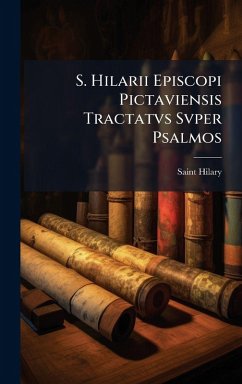S. Hilarii Episcopi Pictaviensis Tractatvs Svper Psalmos is a theological work by Saint Hilary of Poitiers, a prominent 4th-century bishop and Doctor of the Church. This text represents a significant contribution to early Christian biblical exegesis, offering Hilary's interpretations and insights on the Psalms. Written in Latin, the work provides valuable perspectives on the theological and spiritual meanings of the Psalms within the context of early Christian thought. This edition presents a carefully preserved version of Hilary's commentary, making it an essential resource for scholars and students interested in patristics, biblical studies, and the history of Christian theology. Hilary's detailed analysis reflects the intellectual and spiritual landscape of his time, providing a window into the development of Christian doctrine and the enduring legacy of the Psalms in Christian worship and contemplation. This work has been selected by scholars as being culturally important, and is part of the knowledge base of civilization as we know it. This work was reproduced from the original artifact, and remains as true to the original work as possible. Therefore, you will see the original copyright references, library stamps (as most of these works have been housed in our most important libraries around the world), and other notations in the work. This work is in the public domain in the United States of America, and possibly other nations. Within the United States, you may freely copy and distribute this work, as no entity (individual or corporate) has a copyright on the body of the work. As a reproduction of a historical artifact, this work may contain missing or blurred pages, poor pictures, errant marks, etc. Scholars believe, and we concur, that this work is important enough to be preserved, reproduced, and made generally available to the public. We appreciate your support of the preservation process, and thank you for being an important part of keeping this knowledge alive and relevant.
Bitte wählen Sie Ihr Anliegen aus.
Rechnungen
Retourenschein anfordern
Bestellstatus
Storno








